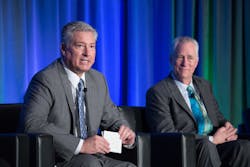LONG BEACH, CA. Continued demands for greater fuel efficiency by fleets means there will not be changes to current product development plans, even if there are alterations to the Phase 2 greenhouse gas (GHG) rules for heavy-duty trucks, a panel of truck manufacturers explained.
Speaking at the Advanced Clean Transportation (ACT) Expo, representatives of five OEMs often found themselves in agreement on current industry issues, along with the belief that emerging technologies will create dramatic changes in the near future.
“I don’t see any changes in product development, nor or we counting on any rollback or seeking any changes [to GHG rules],” noted Jonathan Randall, senior vice president of North American sales for Mack Trucks.
There are two ways the phased-in rollout of the Phase 2 final rule from the Environmental Protection Agency and National Highway Traffic Safety Administration, scheduled to begin in 2018, could be disrupted.
The first is a pending legal challenge to the first ever standard for trailers, includes as part of the overall rule. Additionally, the Trump administration indicated it plans to conduct a government wide review of regulations.
“The product development pipeline has been filled in advance of this [rule],” Kary Schaefer, general manager of marketing and strategy for Daimler Trucks North America (DTNA), pointed out. “A rollback won’t change the technical development of vehicles that have happened or are slated to happen in the future. “
The other OEM representatives on the panel shared that sentiment: Steve Gilligan, North America vice president of product and vocational marketing for Navistar; Brian Lindgren, research and development director for Kenworth Truck Co.; and Bill Kahn, principal engineer and engineering manager of advanced concepts for Peterbilt Motors Co.
Jim Mele, Fleet Owner’s retiring editor in chief, moderated the panel.
The panelists all said they would benefit from an easing of costly and overlapping testing processes, with the savings being redirected into product development.
Gilligan noted that Navistar is “encouraged by the discussion around some lessoning of regulations and is supportive of streamlining cumbersome or conflicting regulatory policies.” However, he expressed concern about the potential fallout from trade decisions.
With manufacturing facilities located outside the U.S., the company is closely watching what happens with the North America Free Trade Agreement (NAFTA). Trump initialed threatened to withdraw the U.S. from the deal, though more recently said he was more interested in a renegotiation.
Additionally, the desire for a greater global vehicle harmonization has taken a hit from the administration’s decision not to move forward with the Trans-Pacific Partnership (TPP).
“TPP was the structure for a harmonization agreement to take place,” Navistar’s Gilligan said. “If it is off the table, the foundation to begin that discussion is gone.”
Likewise, “without a trade agreement between the [European Union] and U.S., there’s virtually no chance of that occurring,” he added.
All of the panelists noted that harmonization is a desired goal, but there are complicating factors.
Lindgren pointed out lower fuel quality in some parts of the world requires different engines, while Kahn noted the unique duty cycles of European trucks, compared with the U.S.
The OEMs officials also shared similar views on alternative fuels, saying they would be prepared to serve customers once favorites emerge. Currently, though, there remain many options in the very early stages, including hydrogen, natural gas and hybrid electrics.
No one alternative for diesel will be the answer for all fleets, they stressed – it will be determined much more by specific application.
That can be seen currently playing out with compressed natural gas.
“The drumbeat may have slowed a little bit . . . but the refuse business is still very heavy into CNG [compressed natural gas],” Mack's Randall explained.
Complementing the sustainability push are new developments in advanced safety systems, optimized cruise control and related technologies that takes some of the driving decisions away from the trucker.
“Data will help determine how to get the right truck in the right operation, and coach the driver to operate the vehicle correctly,” DTNA’s Schaefer emphasized.
Peterbilt’s Kahn in particular remained skeptical on the idea of electric trucks being used in over-the-road operations, such as the one long-teased in recent weeks by Tesla Motors.
Barring a significant battery breakthrough, the estimated $60,000-to-$100,000 cost for batteries and the weight of the equipment makes it a very unlikely scenario, he stressed.
About the Author
Neil Abt
Neil Abt is a former FleetOwner editor who wrote for the publication from 2017 to 2020. He was editorial director from 2018 to 2020.



